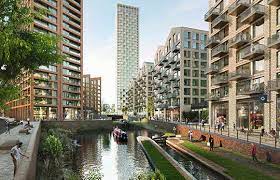Berkeley Group Holdings plc (LON:BKG) has announced its audited results for the year ended 30 April 2022.
Rob Perrins, Chief Executive, Berkley Group said:
“These strong results reflect the stability of our uniquely long-term operating model throughout an exceptionally volatile period. They are underpinned by our portfolio of major brownfield regeneration projects, where patient and sustained investment is transforming disused land into distinct and highly sustainable mixed-use neighbourhoods within the UK’s most undersupplied markets.
We are incredibly proud of the places we create, which are individually designed in close collaboration with local councils and communities to provide the right mix of homes, amenities, natural landscapes, cultural attractions and commercial spaces. Examples include Grand Union, where we completed the first 128 homes this year, 92 of which are affordable rented homes delivered in partnership with Brent Borough Council, alongside a beautiful canal-side public square and 5,000 square foot Community Centre; and the hugely exciting Horlicks Quarter where, in partnership with Slough Borough Council, we have delivered the first 35 homes and the heritage restoration of the iconic factory, clock tower and chimney is well underway.
As the largest contributor to new homes in London, our conviction in the long-term resilience and attraction of the capital has been rewarded by the city’s resurgence post COVID-19, with our passion for creating distinctive and well-rounded neighbourhoods providing a clear advantage as customers increasingly prioritise the quality and character of the local setting post pandemic. The £556 million of subsidies provided to deliver affordable housing and committed to wider community and infrastructure benefits exceeds our profit for the year, and is a clear indicator of the social value and benefits that stem from our unique portfolio of long-term regeneration sites.
Most importantly, the year has seen Berkeley deliver comprehensively on its long-term “Our Vision 2030: Transforming Tomorrow” strategy, through which we are leading the industry in tackling today’s most important challenges. This includes the completion of a ground-breaking research project into embodied carbon, which involved detailed studies of 15 of our buildings to identify the most carbon intensive materials and processes, providing previously unavailable data and insight. This has been instrumental in developing our roadmap for meeting our ambitious science-based target to reduce embodied carbon in our buildings by 40% by 2030. This research also demonstrated the progress Berkeley has already made in this area, with our buildings already well below business as usual embodied carbon benchmarks. This is a strong position from which Berkeley and its supply chain can lead the transition to a low carbon, high growth economy.
Berkeley has continued to pioneer nature recovery within our industry, with 46 sites now having net biodiversity gain strategies in place, which together will create more than 500 acres of new or measurably improved natural habitats. Reflecting our focus on brownfield regeneration, most of these beautiful green and blue spaces are being created in urban areas where nature is most depleted and communities lack accessible green space. These sites are set to deliver an average net biodiversity gain of over 400%, far exceeding the Government’s proposed 10% minimum target and reflecting the wider benefits of reviving brownfield land.
We have maintained our industry leading customer Net Promoter Score and health and safety performance and continued our investment in skills and training to make sure our industry is a great place to work for young people looking to begin their careers.
Berkeley has invested £4 billion in its development activities over the last two years. This level of investment and the continued drive to innovate requires a stable and fair regulatory environment that is supportive of responsible businesses. The last year has seen increases in taxation for all businesses and our sector in particular which has also faced further regulatory changes. The restoration of a stable and predictable regulatory and taxation regime is in the interests of both business and Government. For without it, there is a risk that the investment required to deliver much needed new homes and the transition to net zero will not come forward at the necessary pace.
The progress over the last twelve months has been extraordinary and has required a combination of expertise, innovation and determination. I would like to thank our exceptional people and partners for their tremendous efforts and commitment to achieve these results against such a volatile and uncertain backdrop.”
TRADING PERFORMANCE
· Value of underlying reservations up 25% on last year and slightly ahead of pre-pandemic levels, with cost inflation absorbed by sales prices.
· Stable start to the current year with enquiries, visitor numbers and reservations in line with the end of 2021/22.
· Cash due on forward sales up to £2.2 billion (2021: 1.7 billion).
INCREASING INVESTMENT AND DELIVERY
· Berkeley now has £8.3 billion of estimated future gross margin in its unrivalled land holdings, meeting its £7.5 billion target three years early, following the St William transaction, and will now only acquire new land very selectively.
· £412.5 million acquisition of the remaining 50% share of St William saw Berkeley gain full control of 24 sites with the potential to deliver over 20,000 homes.
· Further investment in Berkeley’s unique operating model:
o Four new sites acquired covering around 6,000 homes, including the strategic land site at Milton Keynes on which Berkeley has recently obtained planning consent for the delivery of up to 4,600 new homes and 403,000 square metres of logistics space, as well as fantastic new local amenities, a 155-acre country park and new bridge over the M1.
o Four major new planning consents obtained on long-term developments: Milton Keynes and St William’s Bow Common (1,000 homes), Leyton (570 homes) and Bethnal Green (550 homes).
o Seven sites, with the capacity to deliver over 5,000 homes, moved into production.
· Berkeley now has 26 of its 32 long-term complex regeneration developments in production.
· In addition, Berkeley has approximately 8,000 plots on six sites that constitute its pipeline.
DELIVERING FOR ALL STAKEHOLDERS
· 3,760 homes delivered, plus 872 in joint ventures (2021: 2,825, plus 429 in joint ventures); a 42% increase. Berkeley is delivering some 10% of London’s new private and affordable homes – supporting approximately 27,000 UK jobs per annum directly and indirectly through its supply chain over the last five years.
· Over £555 million of subsidies provided to deliver affordable housing and committed to wider community and infrastructure benefits in the year; a similar level to the year’s pre-tax profit.
· Industry leading Net Promoter Score (+77.2) and customer satisfaction ratings maintained.
· 15 embodied carbon assessments undertaken to create a roadmap which has already identified 16 specific actions to help Berkeley meet its ambitious science-based target in this area.
· Green Bond Framework put in place to support £400 million Green Bond issuance in August 2021.
· Berkeley has an industry leading “A-” CDP rating for its carbon climate action and transparency and has recently once again been AAA rated in the MSCI global ESG index.
· 46 developments now committed to net biodiversity gain strategies that will deliver over 500 acres of new or measurably improved natural habitat, not including the 155-acre country park planned for our Milton Keynes site.
· Annual Injury Incident Rate of 0.72 (industry average 2.72)
· More than 60 construction management apprentices and 30 graduates joined the business in the year, with 9% of Berkeley’s workforce consisting of ‘earn and learn’ roles.
SHAREHOLDER RETURNS
· Berkeley anticipates delivering pre-tax earnings of approximately £600 million for the year ending 30 April 2023 and £625 million for the two years thereafter, following which the focus will shift to returning cash over and above the current annual scheduled payment to shareholders.
· Commitment to annual £282 million (£2.54 per share) ongoing Shareholder Returns up to 30 September 2025 re-affirmed, with next £141 million due for the six months ending 30 September 2022, of which £64 million has already been returned via share buy-backs.
· £451 million B-share return of capital made in September 2021, which was followed by a share consolidation.
· Return of previously identified £455 million Surplus Capital completed through the B-share return and acquisition of St William land interests.
Investor and Analyst Presentation:
A pre-recorded presentation by the Directors of Berkeley Group on the results will be made available on the Company’s website at 11:00 today – https://www.berkeleygroup.co.uk/about-us/investor-information/results-and-announcements.








































